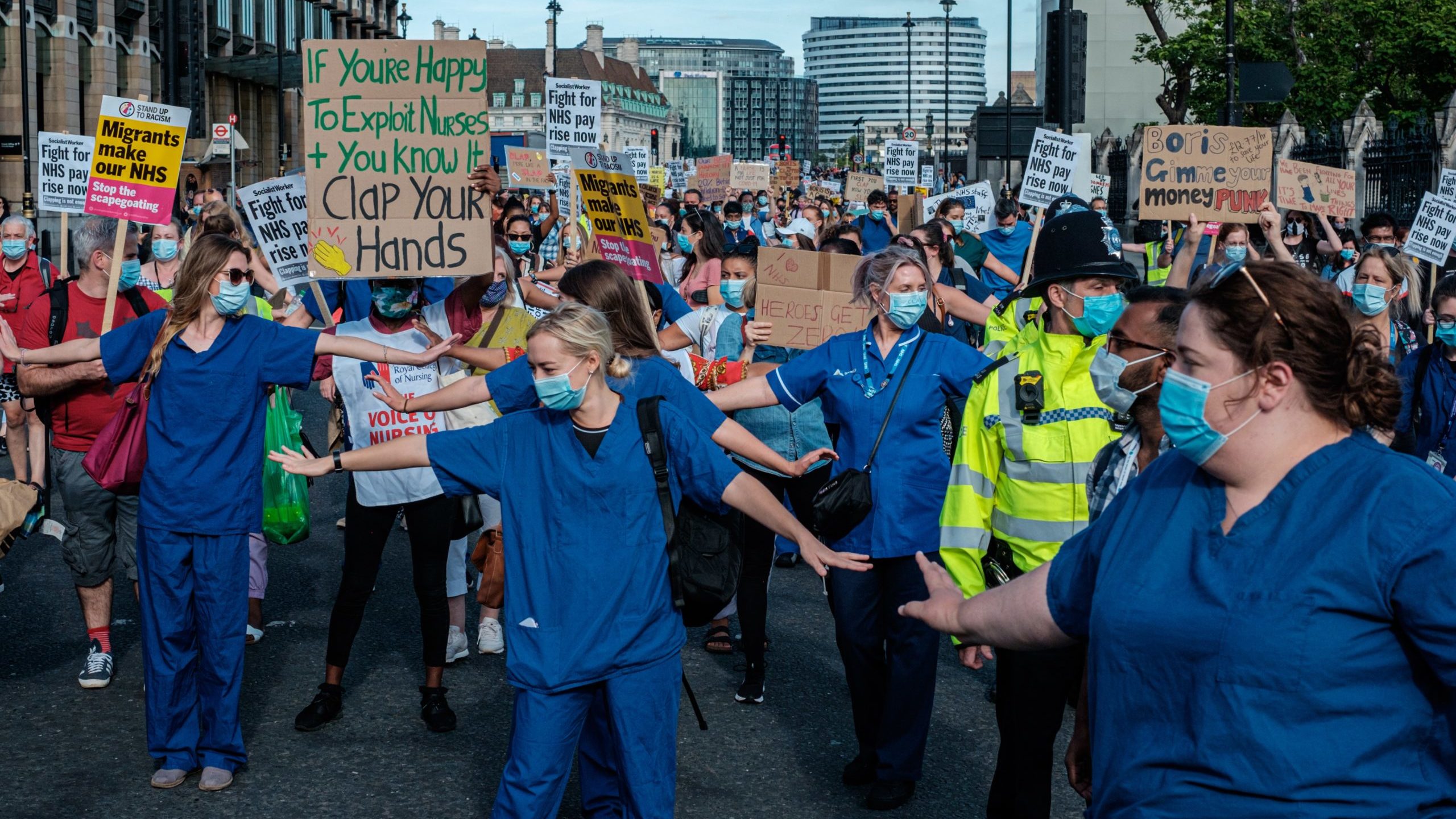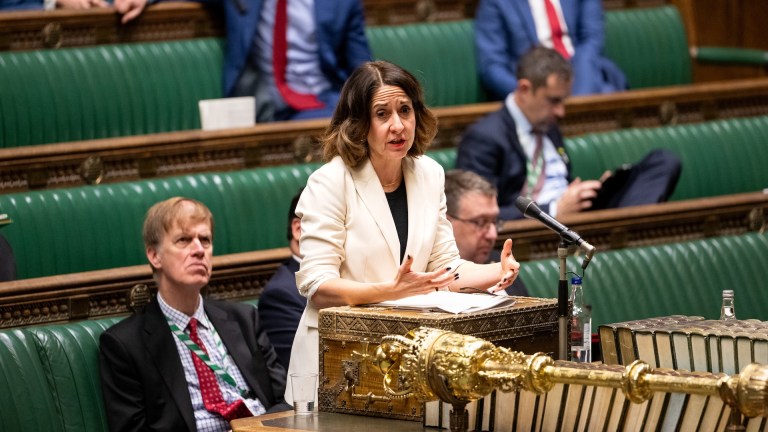Thursday January 19 in England
Monday February 6 in England and Wales
Tuesday February 7 in England and Wales
Ambulance workers have also announced strike dates in January, with members of Unison walking out on January 23.
Where are nurses going on strike?
NHS trusts voted individually on the action, with 55 trusts in England voting to strike in January, nine more than in the December strike action.
February will see the most widespread protest among nurses so far, with nurses in Wales also joining the strike action. Both the UK and Welsh governments have refused to “seriously negotiate on the current year’s NHS pay deal”, says the RCN.
Advertising helps fund Big Issue’s mission to end poverty
In Scotland, the RCN has paused a formal announcement of strike action while talks take place with the Scottish government.
Nurses in Northern Ireland are not part of the strikes in January or February at this stage, a RCN spokesperson told The Big Issue.
Click here to see the full list of NHS trusts that have voted to strike
Why are nurses going on strike?
Britain’s nurses are facing a workforce crisis. The number of nurses and midwives quitting their jobs has risen for the first time in four years – suggesting conditions are even worse than during the pandemic. On average, 500 nurses are leaving every week.
In the last year, 25,000 nursing staff around the UK left the Nursing and Midwifery Council (NMC) register. There are 47,000 unfilled registered nurse posts in England’s NHS alone.
Severely understaffed wards are not only causing extreme stress and burnout, says the RCN, but are impacting the safety of patients and the quality of the treatment they can receive.
Advertising helps fund Big Issue’s mission to end poverty
The RCN is seeking a pay rise of 5 per cent above inflation to make up for what it calls a decade of real-terms pay cuts. With inflation currently at 11.1 per cent, this would be a 16.1 per cent pay rise.
Only with higher pay will the sector be able to retain and attract new nurses, the union says, with two-thirds of nurses working in general practice thinking about leaving the profession within a year because of low pay.
Despite this year’s pay award, the RCN said experienced nurses are worse off by 20 per cent in real terms due to successive below-inflation pay awards dating back to 2010. In Scotland that figure is estimated to be 16 per cent.
Independent research commissioned by the RCN has shown the exchequer would recoup 81 per cent of the initial outlay of a significant pay rise in terms of higher tax receipts and savings on future recruitment and retention costs.
Get the latest news and insight into how the Big Issue magazine is made by signing up for the Inside Big Issue newsletter
What impact will a nurses strike have on health services?
When nurses strike there will be disruption to planned appointments and procedures, the RCN has said. This would likely lengthen backlogs and waiting lists. There would, however, be measures in place to ensure patient safety is not at risk.
Advertising helps fund Big Issue’s mission to end poverty
Studies have shown that short-staffing, whether caused by strike action or workforce crisis, has a “profound effect on nurses’ ability to do their jobs, increases rates of medical error and leads to preventable patient deaths”.
There is a legal requirement on trade unions to make sure that strike action does not endanger human life or cause serious injury – it is a criminal offence to strike if there is a risk of this happening.
Emergency treatment by nurses will always be maintained, the RCN has emphasised. A team will review minimal staffing levels at every health trust facing strike action to make sure there are always enough nurses working to maintain patient safety.
If a major emergency were to happen requiring more nursing staff, nurses would be taken off picket lines and return to work, the RCN said.
There are different ways of managing a nursing strike. Trusts may choose to implement a “Sunday service” or Christmas Day service or make certain essential services – such as intensive care – exempt from strike action.
What have politicians said about the strikes?
So far, Rishi Sunak’s government has refused to budge on pay, standing by the pay award it imposed last September of 5.5 per cent for new nurses, and 3.7 per cent for most others.
Advertising helps fund Big Issue’s mission to end poverty
In December health minister Steve Barclay told NHS workers that they could “look forward” to next year’s pay deal, but has so far refused to increase the government’s 2022 pay award.
But in a possible change of heart, Barclay has reportedly said he wants more money for all NHS staff except doctors, the Observer has revealed. This has caused a rift in the cabinet with prime minister and his chancellor Jeremy Hunt who continue to argue that there is no more money available.
The most recent round of NHS pay negotiations failed again after the government reportedly told the unions they would need to justify a pay rise with increased productivity, according to a Unite negotiator.
The Big Issue’s #BigFutures campaign is calling for investment in decent and affordable housing, ending the low wage economy, and millions of green jobs. The last 10 years of austerity and cuts to public services have failed to deliver better living standards for people in this country. Sign the open letter and demand a better future.
These are the NHS trusts where nurses will strike in January:
England
East Midlands
NHS Derby and Derbyshire ICB (Joined Up Care Derbyshire)
Derbyshire Healthcare NHS Foundation Trust
Advertising helps fund Big Issue’s mission to end poverty
Derbyshire Community Health Services NHS Foundation Trust
East
Norfolk and Norwich University Hospitals NHS Foundation Trust
East Suffolk and North Essex NHS Foundation Trust
Norfolk Community Health and Care NHS Trust
Norfolk and Suffolk NHS Foundation Trust
West Suffolk NHS Foundation Trust
Advertising helps fund Big Issue’s mission to end poverty
NHS Mid and South Essex ICB
NHS Norfolk and Waveney ICB
NHS Suffolk and North East Essex ICB
London
Hounslow and Richmond Community Healthcare NHS Trust
St George’s University Hospitals NHS Foundation Trust
Kings College Hospital NHS Foundation Trust
Advertising helps fund Big Issue’s mission to end poverty
Tavistock and Portman NHS Foundation Trust
University College London Hospitals NHS Foundation Trust
NHS South West London ICB
North-west
University Hospitals of Morecambe Bay NHS Foundation Trust
Tameside and Glossop Integrated Care NHS Foundation Trust
Lancashire Teaching Hospitals NHS Foundation Trust
Advertising helps fund Big Issue’s mission to end poverty
The Christie NHS Foundation Trust
Wrightington Wigan and Leigh NHS Foundation Trust
Countess of Chester Hospital NHS Foundation Trust
Mid Cheshire Hospitals NHS Foundation Trust
Bridgewater Community Healthcare NHS Foundation Trust
Wirral Community Health and Care NHS Foundation Trust
Advertising helps fund Big Issue’s mission to end poverty
Wirral University Teaching Hospital NHS Foundation Trust
NHS Cheshire and Merseyside ICB
St Helens and Knowsley Teaching Hospitals NHS Trust
NHS Lancashire and South Cumbria ICB
Cheshire and Wirral Partnership NHS Foundation Trust
North
County Durham and Darlington NHS Foundation Trust
Advertising helps fund Big Issue’s mission to end poverty
South Tees Hospitals NHS Foundation Trust
North of England CSU (NECS)
South-east
Kent Community Health NHS Foundation Trust
East Sussex Healthcare NHS Trust
University Hospitals Sussex NHS Foundation Trust
Sussex Community NHS Foundation Trust
Advertising helps fund Big Issue’s mission to end poverty
Sussex Partnership NHS Foundation Trust
Queen Victoria Hospital NHS Foundation Trust
NHS Kent and Medway ICB
NHS Surrey Heartlands ICB
Southern Health NHS Foundation Trust
Portsmouth Hospitals NHS Trust
Advertising helps fund Big Issue’s mission to end poverty
University Hospital Southampton NHS Foundation Trust
Solent NHS Trust
South-west
Cornwall Partnership NHS Foundation Trust
Dorset Healthcare University NHS Foundation Trust
Dorset County Hospital NHS Foundation Trust
Avon and Wiltshire Mental Health Partnership NHS Trust
Advertising helps fund Big Issue’s mission to end poverty
Salisbury NHS Foundation Trust
University Hospitals Dorset NHS Foundation Trust
Somerset NHS Foundation Trust
Royal Cornwall Hospitals NHS Trust
NHS Dorset ICB (Our Dorset)
West Midlands
Midlands Partnership NHS Foundation Trust
Advertising helps fund Big Issue’s mission to end poverty
Shropshire Community Health NHS Trust
Robert Jones and Agnes Hunt Orthopaedic Hospital NHS Foundation Trust
Dudley Integrated Health and Care NHS Trust
NHS Black Country ICB
Midlands and Lancashire CSU
Yorkshire and Humber
Sheffield Health and Social Care NHS Foundation Trust
Advertising helps fund Big Issue’s mission to end poverty
Barnsley Hospital NHS Foundation Trust
York and Scarborough Teaching Hospitals NHS Foundation Trust
Harrogate and District NHS Foundation Trust
Sheffield Teaching Hospitals NHS Foundation Trust
Sheffield Children’s NHS Foundation Trust
NHS West Yorkshire ICB
Advertising helps fund Big Issue’s mission to end poverty
National employers
NHS Resolution
NHS Blood and Transplant (NHSBT)
In February, the following NHS Trusts in Wales will join the nurse strike:
Cardiff and Vale University Health Board
Powys Teaching Local Health Board
Welsh Ambulance Services NHS Trust Headquarters
Hywel Dda University Health Board
Advertising helps fund Big Issue’s mission to end poverty
Swansea Bay University Health Board
Cwm Taf Morgannwg University Health Board
Betsi Cadwaladr University Local Health Board
Velindre NHS Trust










